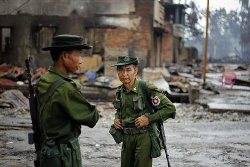Burmese security forces organized and stood guard over Buddhist attacks on Muslim settlements before burying scores of bodies, some with their hands tied behind their backs, in mass graves, Human Rights Watch said in a report today.
Evidence of official involvement in the massacres that left hundreds dead was gathered by HRW researchers at 27 different sites in Arakan State, including at four mass graves dug between June and October last year.
The report is the most comprehensive evidence yet that the Burmese government colluded in a wave of ethnic attacks and was released just hours before the EU was due to drop sanctions on the Burmese regime as a reward for reformist pledges at a meeting in Luxembourg on Monday.
At one mass grave near the town of Sittwe, local residents took photographs of the 18 bodies dumped in a freshly dug grave. The corpses had their hands tied behind their back with plastic strips used by the police.
"They dropped the bodies right here," a Rohingya man, who saw the bodies being dumped and later buried told HRW. "Three bodies had gunshot wounds. Some had burns, some had stab wounds. One gunshot wound was on the forehead, one on the chest. Two men's hands were tied at the wrists in front and another one had his arms tied in the back."
More than 100 witnesses to the violence, which was speared by Buddhist monks and a nationalist political movement in the region, Rakhine Nationalities Development Party, cited repeated cases in which the police and army would arrive at the scene prior to an attack. Having reassured locals with a cordon, they would then breach promises by allowing attacks and joining in the violence.
In the worse single massacre of the three month outbreak more than 70 people, including 28 children were hacked to death in a day long massacre at Yan Thei village.
"The policemen were telling us to go back in to the village. At that time the Arakanese were coming toward us. We were trapped," said one man. "First they said they would protect us but when the violence started they took sides with the Arakanese people."
Muslims are resented in the region as immigrants who have crossed illegally from Bengal into Burma, even though most of those affected have lived in the area for several generations. "The Burmese government engaged in a campaign of ethnic cleansing against the Rohingya that continues today through the denial of aid and restrictions on movement," said Phil Robertson, deputy Asia director at HRW. "The government needs to put an immediate stop to the abuses and hold the perpetrators accountable or it will be responsible for further violence against ethnic and religious minorities in the country."
More than 125,000 were displaced in the violence last year and the UN yesterday warned those still living in camps face a catastrophe from adverse weather and poor conditions over the summer months.
"UNHCR is seriously concerned about the risks facing over 60,000 displaced people in flood-prone areas and in makeshift shelters," Adrian Edwards, a spokesman for the United Nation's refugee organization said.
"From May to September, the monsoon season is expected to unleash heavy rains and possible cyclones in Rakhine state, where more than 115,000 people remain uprooted after last year's inter-communal violence," he warned.
Abu Tahay from the National Democratic Party for Development, which represents the Rohingya, said Burma's world renowned democracy campaigner Aung San Suu Kyi has an "obligation" to speak out against the Burmese government involvement in the attacks.
Allies of Miss Suu Kyi, who has given the Burmese government crucial international backing by refusing to join outright condemnation of the violence have acknowledge the predicament has damaged her authority.
"There was some damage to her moral authority because of this situation. Daw Suu also knows about it," Win Tin, a co-founder of her National League for Democracy said.
But experts in Burmese politics said Miss Suu Kyi cannot offend the core segment of ethnic Burmese voters who sympathize with the anti-Muslim groups.
"Aung San Suu Kyi has an election to win in 2015. She risks alienating politically potent Buddhist elements among her own supporters if she appears too cozy with the Rohingya, or other Muslims," said Nicholas Farrelly of the Australian National University. "Western human rights activists and international opponents of anti-Islamic prejudice will not have a vote in who runs Myanmar in the years ahead," he said.
PHOTO CAPTION
Burmese soldiers patrol through a neighborhood that was burnt during violence against Muslims in Sittwe June 14, 2012.
Source: The Telegraph


 Home
Home Discover Islam
Discover Islam Quran Recitations
Quran Recitations Lectures
Lectures
 Fatwa
Fatwa Articles
Articles Fiqh
Fiqh E-Books
E-Books Boys & Girls
Boys & Girls  Ramadan
Ramadan Fatwa Audios
Fatwa Audios Month of Mercy
Month of Mercy Women
Women Eed Al- Fitr
Eed Al- Fitr Food Recipes
Food Recipes Videos
Videos

 Prayer Times
Prayer Times












